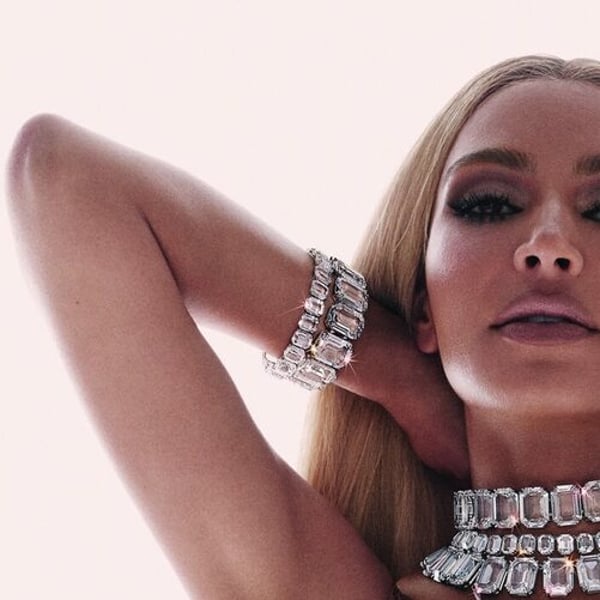By
Bloomberg
Published
Nov 8, 2023
Swarovski Chief Executive Officer Alexis Nasard expects sales growth to remain relatively unchanged or even to decline, from 10% in 2022 to “low or mid-single digits” this year, amid a global slowdown in luxury consumption.
Speaking to Bloomberg News before the soft opening of the company’s new flagship store in New York City, Nasard said profits and cash flow are projected to rise by “double-digit” levels even as Swarovski maintains its marketing outlay, keeps its retail footprint at current levels and continues to upgrade stores around the world.
Global luxury brands from LVMH to Prada to Gucci are experiencing slowing or falling sales as rising inflation and higher interest rates force aspirational consumers to spend less on discretionary goods.
Swarovski, founded in 1895 by Daniel Swarovski in Austria, remains family-owned, generating €1.83 billion ($1.96 billion) in revenue last year. Globally it boasts 6,500 points of sale, 1,300 of which are owned boutiques, Nasard said. Historically the company has been best known for its affordable cut-crystal jewelry and collectible figurines—basic stud earrings cost $65 a pair.
“Across the board, the aspirational consumer is becoming more spending-shy,” he said. “We are cautiously hopeful that we offer a very wide palette of products and prices, which we hope will be some kind of hedge for turbulent economic times.”
Nasard said sales in both the US and China were up 6% year to date, while German-speaking markets were experiencing very strong performances. Other markets such as South Korea and the UK were fairly flat.
“What will make the difference between those who will prove to be resilient and those who will prove to be less resilient is the absolute crystal discipline on developing the brand, because ultimately it is all about brand desirability,” he said, speaking about the lifestyle-retail sector in general. This raises the stakes for the New York flagship, in the US’s most famous high-end shopping district, which is part of a broader strategy of shaping Swarovski in the minds of residents across the world’s most important centers.
“A store is our first moment of truth, and the role that the flagship plays goes beyond the P&L and commercial transactions—it’s a brand temple where you go through a brand immersion,” he said. “Between New York, London and Singapore, sometimes trends travel a lot faster than between London and, say, Wales for example.”
Nasard is the first Swarovski CEO to come from outside the founding family. The company underwent its biggest revamp after his predecessor, Robert Buchbauer, won approval to shrink the workforce and refocus on higher-margin jewelry, against the wishes of some other family members. Today’s shoppers are increasingly steered toward more complex—and lucrative—product lines, such as this $20,000 sculpture turned New York souvenir or this $6,800 lab-grown-diamond tennis bracelet.
For a company that retails intricately cut and colored crystal gifts and accessories, branding is key to success. Having previously worked in senior marketing and management roles at the likes of beermaker Heineken, Nasard ran market-research firm Kantar for four months before stepping down in 2021.
The company’s most visible strategy for success will be to ramp up major marketing events and collaborations in top cities around the world. One example was the “Swarovski Masters of Light – From Vienna to Shanghai” installation, which created a space for exhibiting jewelry, art and collaborations at Shanghai’s Museum of Contemporary Art from Sept. 20 to early October.
Much of the styling and design language featured in that event—a palette of bold colors interjected with the brand’s signature octagons acting as displays—form the basis of Swarovski’s New York store, according to renderings supplied by the company. The 14,000-square-foot space will be split across two floors on 680 Fifth Ave., less than a half-mile from Rockefeller Center. The store will have an event there on November 7 with a full opening later in the month.
“We had more than 1.2 billion impressions after that event,” Nasard said, referring to the Shanghai museum takeover. “These are what we call major brand moments, and it is an essential part of our activity system. You should expect to see more of those in the future, as well as third-party brand collaborations.”
One of those was announced this week: Swarovski’s partnership with Kim Kardashian and her Skims body wear range to create a crystal-imbued line. That builds on similar collaborations, like the one with model Bella Hadid. More will come, with collections extended throughout the brand’s points of sale.
“We have no intentions of expanding it significantly or shrinking it significantly, but within that perimeter we intend to gradually go up in quality,” Nasard said, describing the mantra as “feeding and weeding—shutting down some locations and opening up some new locations.”
Other areas that will be key sources of sales and profit growth, he said, include Swarovski’s lab-grown-diamond program, as well as the use of artificial intelligence and automation in its supply chain, market research and understanding of consumers.







